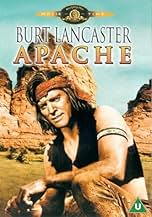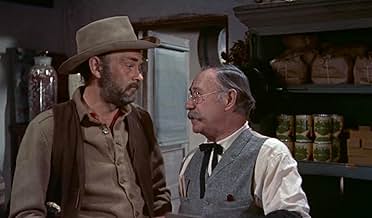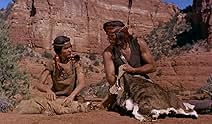IMDb-BEWERTUNG
6,3/10
5274
IHRE BEWERTUNG
Massai, ein Apachenkrieger, weigert sich, sich in ein Reservat in Florida umzusiedeln. Er entkommt seinen Entführern und kehrt in seine Heimat zurück, um ein friedlicher Farmer zu werden.Massai, ein Apachenkrieger, weigert sich, sich in ein Reservat in Florida umzusiedeln. Er entkommt seinen Entführern und kehrt in seine Heimat zurück, um ein friedlicher Farmer zu werden.Massai, ein Apachenkrieger, weigert sich, sich in ein Reservat in Florida umzusiedeln. Er entkommt seinen Entführern und kehrt in seine Heimat zurück, um ein friedlicher Farmer zu werden.
- Regie
- Drehbuch
- Hauptbesetzung
Charles Bronson
- Hondo
- (as Charles Buchinsky)
Dehl Berti
- Cherokee Householder
- (Nicht genannt)
Paul E. Burns
- General Store Proprietor
- (Nicht genannt)
Lonnie Burr
- Indian Boy
- (Nicht genannt)
Jerado Decordovier
- Apache
- (Nicht genannt)
John George
- Shoeshine Man
- (Nicht genannt)
Anne Kunde
- Townswoman Leaving Trading Post
- (Nicht genannt)
Rory Mallinson
- Citizen Noticing Handcuffs
- (Nicht genannt)
Mort Mills
- Sergeant of the Guard Fort.
- (Nicht genannt)
Empfohlene Bewertungen
Apache is one of the first Hollywood films which dealt in a serious, thought-provoking and openly sympathetic way with the suffering of the native Americans as a consequence of the white man's expansion to the West. It is interesting to watch this film side by side with, for instance, John Ford's silent classic The Iron Horse, as we can see two opposite approaches to the history of the American West in the late 19th century. While Ford's epic production is a hymn to white man's progress and to the expansion of civilization to the wild, unexplored territories of the United States inhabited by the Indian nations, Apache is a touching drama about the desperate fight for survival of those same Indians, who were ruthlessly driven out of their ancestral lands and ways of life by the stern advance of material progress. The plight of the Apache nation is embodied by the central character of the film, the strong, stubborn, freedom-loving and nobly human Indian warrior Massai, played by the actor Burt Lancaster, who was also the inspirer and producer of the film. Unwilling to accept personal slavery and what he deems as the total humiliation of his nation after Chief Geronimo's surrender to the U.S. Army and the confinement of the Apache tribes to the reserve, Massai decides to start a one-man fight for human dignity and freedom and becomes a solitary outlaw at war with the local U.S. Army garrison.
The film is certainly worth watching, not only because of the human interest of the story itself, but also as a well-crafted piece of cinema. Apache is the first great movie by the director Robert Aldrich, who in that year of 1954 would score double and reward us with another masterpiece, the unforgettable Veracruz, also with a Burt Lancaster in absolute state of grace as an actor, this time teaming with the veteran Gary Cooper.If in Veracruz Lancaster gave as a memorable performance as the attractive villain Joe Erin, here he is no less powerful as the honest and indomitable warrior Massai. At his side, also good performances by Jean Peters in the role of the faithful, ever-loving and determined squaw Nalinle, and John McIntire as the hard-boiled, cynical Indian-hunter Al Sieber, in a role that prefigures the twilight heroes of Peckinpah's films.
All in all, a classic of the Western genre which inaugurated Aldrich's later shining career.
The film is certainly worth watching, not only because of the human interest of the story itself, but also as a well-crafted piece of cinema. Apache is the first great movie by the director Robert Aldrich, who in that year of 1954 would score double and reward us with another masterpiece, the unforgettable Veracruz, also with a Burt Lancaster in absolute state of grace as an actor, this time teaming with the veteran Gary Cooper.If in Veracruz Lancaster gave as a memorable performance as the attractive villain Joe Erin, here he is no less powerful as the honest and indomitable warrior Massai. At his side, also good performances by Jean Peters in the role of the faithful, ever-loving and determined squaw Nalinle, and John McIntire as the hard-boiled, cynical Indian-hunter Al Sieber, in a role that prefigures the twilight heroes of Peckinpah's films.
All in all, a classic of the Western genre which inaugurated Aldrich's later shining career.
If you can suspend disbelief that Burt Lancaster and Jean Peters are Apaches, then this isn't a bad western. If you can't, well then there's gonna be a lot of low ratings posted here.
In 1886, Geronimo and his braves surrender to the U.S. Calvary in New Mexico and are shipped off to Ft. Marion, Florida. All except one, an Apache named Massai (Burt Lancaster) who begins a one man war against the whites.
Massai escapes from the train that is shipping the Apaches back east and makes his way back to New Mexico. From there, he attacks wagons, soldiers, bridges etc., making life hard for the authorities. He kidnaps Nalinle (Jean Peters) and takes her up to the hills with him while Indian scouts John McIntire and Charles Bronson hunt them down.
Massai finds an isolated spot in the high country and starts to plant a small corn field from seed he got from a Cherokee farmer (Morris Ankrum). He also gets Peters pregnant with child.
The ending scene in Massai's little cornfield is pure Hollywood. The action scenes are tight as we see Lancaster jumping from rock to rock as he picks off at least 10 of the Indian scouts that have him surrounded. But then as Massai is wounded and runs into McIntire in the cornfield, disbelief occurs and the conclusion seems tacked on in order to make a happy ending out of it. You'll have to see it for yourself.
Still, it's entertaining enough as it is. It's based on a true incident and Lancaster at least brings some dignity to his role as the noble warrior turned farmer who wants to be left in peace. It could've turned out a lot worse.
I give it a 6 out of 10 for his performance alone.
In 1886, Geronimo and his braves surrender to the U.S. Calvary in New Mexico and are shipped off to Ft. Marion, Florida. All except one, an Apache named Massai (Burt Lancaster) who begins a one man war against the whites.
Massai escapes from the train that is shipping the Apaches back east and makes his way back to New Mexico. From there, he attacks wagons, soldiers, bridges etc., making life hard for the authorities. He kidnaps Nalinle (Jean Peters) and takes her up to the hills with him while Indian scouts John McIntire and Charles Bronson hunt them down.
Massai finds an isolated spot in the high country and starts to plant a small corn field from seed he got from a Cherokee farmer (Morris Ankrum). He also gets Peters pregnant with child.
The ending scene in Massai's little cornfield is pure Hollywood. The action scenes are tight as we see Lancaster jumping from rock to rock as he picks off at least 10 of the Indian scouts that have him surrounded. But then as Massai is wounded and runs into McIntire in the cornfield, disbelief occurs and the conclusion seems tacked on in order to make a happy ending out of it. You'll have to see it for yourself.
Still, it's entertaining enough as it is. It's based on a true incident and Lancaster at least brings some dignity to his role as the noble warrior turned farmer who wants to be left in peace. It could've turned out a lot worse.
I give it a 6 out of 10 for his performance alone.
The movie tells the story of a rebellious apache who refuses to surrender with his chief Geronimo,and wages a one-man war against the U.S. cavalry.
Following movies like "Broken Arrow (1950)" this film takes the side of the Indian.Lancaster is again at his most athletic in the leading role,but he makes a rather unlikely Indian.The same could be said of Jean Peters,who nevertheless looks ravishing as Lancaster's squaw.It's anyway an entertaining movie.
Following movies like "Broken Arrow (1950)" this film takes the side of the Indian.Lancaster is again at his most athletic in the leading role,but he makes a rather unlikely Indian.The same could be said of Jean Peters,who nevertheless looks ravishing as Lancaster's squaw.It's anyway an entertaining movie.
Apache is directed by Robert Aldrich and adapted to screenplay by James R. Webb from the novel "Broncho Apache" written by Paul Wellman. It stars Burt Lancaster, Jean Peters, John McIntire, John Dehner, Charles Bronson and Paul Guilfoyle. Music is by David Raksin and cinematography by Ernest Laszlo.
"This is the story of Massai, the last Apache warrior. It has been told and re-told until it has become one of the great legends of the Southwest. it began in 1886 with Geronimo's surrender."
Apache has problems, undoubtedly, from the casting of overtly bright eyed Americans in the principal Native American roles, to the shift into love story territory, and on to the studio enforced compromised ending, it's a mixed bag for sure. If you can get over these "issues" then there is still a lot to enjoy here.
You're not a warrior any more; you're just a whipped Injun.
Apache follows in the footsteps made by Broken Arrow and Devil's Doorway that saw a shift in how Native Americans were being represented on screen. The story of Massai (Lancaster) is a fascinating one, even if the movie doesn't quite be all that it can be. It shows him as a stoic and complex individual, fiercely determined in a last man standing type of way, while his confusion with the world he no longer understands - or cares to be part of - is expertly realised by Lancaster and Aldrich. One sequence has Massai walk through town observing the alien white man world at work, including Chinese folk busying themselves in a laundry, it's a smart piece of writing, proving that there is intelligence and points of worth in the story.
You are like a dying wolf biting at its own wounds.
Thankfully the film doesn't go too far the other way and paint Massai as a saint, we know what he is capable off, and he shows us his skills as a warrior as the story moves on. There's even a scene of major manhandling of Nalinle (Peters) that is uncomfortable viewing but actually integral to Massai's emotional state and how the story between the two unfolds. Here in is the problem, once Massai and Nalinle "fall" for each other the picture loses its edge, where even though Aldrich inserts some more action sequences, the grit, intelligence and narrative thrust has disappeared. This all leads to the ending, that as written originally should have seen a cold and dark finish along the lines of the brilliant Devil's Doorway. Instead we get something approaching cuteness and not as profound as the studio obviously thought it was.
The casting of Lancaster and Peters gives the film athletic muscularity and beauty (respectively), certainly in Lancaster's case he throws himself into a role he actively courted to take him onto another acting level (he co-produced it with Harold Hecht). It takes some getting used to, but they provide wholesome characterisations even if they never convince as Native Americans. Support work from McIntire and Dehner is strong, but unfortunately Bronson (here billed as Buchinsky) is short changed by a screenplay that doesn't enhance a very promising character. Raksin's score blends the usual Indian thrums with a love theme that is not dissimilar to the love theme used by Alex North for Spartacus six years later. While Laszlo's Technicolor photography is grade "A" stuff where the landscapes (a number of locations were used, primarily in California) form a telling part of the plotting.
Problems for sure here, and in truth it's the weakest Western made by the Aldrich/Lancaster pairing, but it has good strengths, it was a financial success and it's a story well worth being told. 7/10
"This is the story of Massai, the last Apache warrior. It has been told and re-told until it has become one of the great legends of the Southwest. it began in 1886 with Geronimo's surrender."
Apache has problems, undoubtedly, from the casting of overtly bright eyed Americans in the principal Native American roles, to the shift into love story territory, and on to the studio enforced compromised ending, it's a mixed bag for sure. If you can get over these "issues" then there is still a lot to enjoy here.
You're not a warrior any more; you're just a whipped Injun.
Apache follows in the footsteps made by Broken Arrow and Devil's Doorway that saw a shift in how Native Americans were being represented on screen. The story of Massai (Lancaster) is a fascinating one, even if the movie doesn't quite be all that it can be. It shows him as a stoic and complex individual, fiercely determined in a last man standing type of way, while his confusion with the world he no longer understands - or cares to be part of - is expertly realised by Lancaster and Aldrich. One sequence has Massai walk through town observing the alien white man world at work, including Chinese folk busying themselves in a laundry, it's a smart piece of writing, proving that there is intelligence and points of worth in the story.
You are like a dying wolf biting at its own wounds.
Thankfully the film doesn't go too far the other way and paint Massai as a saint, we know what he is capable off, and he shows us his skills as a warrior as the story moves on. There's even a scene of major manhandling of Nalinle (Peters) that is uncomfortable viewing but actually integral to Massai's emotional state and how the story between the two unfolds. Here in is the problem, once Massai and Nalinle "fall" for each other the picture loses its edge, where even though Aldrich inserts some more action sequences, the grit, intelligence and narrative thrust has disappeared. This all leads to the ending, that as written originally should have seen a cold and dark finish along the lines of the brilliant Devil's Doorway. Instead we get something approaching cuteness and not as profound as the studio obviously thought it was.
The casting of Lancaster and Peters gives the film athletic muscularity and beauty (respectively), certainly in Lancaster's case he throws himself into a role he actively courted to take him onto another acting level (he co-produced it with Harold Hecht). It takes some getting used to, but they provide wholesome characterisations even if they never convince as Native Americans. Support work from McIntire and Dehner is strong, but unfortunately Bronson (here billed as Buchinsky) is short changed by a screenplay that doesn't enhance a very promising character. Raksin's score blends the usual Indian thrums with a love theme that is not dissimilar to the love theme used by Alex North for Spartacus six years later. While Laszlo's Technicolor photography is grade "A" stuff where the landscapes (a number of locations were used, primarily in California) form a telling part of the plotting.
Problems for sure here, and in truth it's the weakest Western made by the Aldrich/Lancaster pairing, but it has good strengths, it was a financial success and it's a story well worth being told. 7/10
Very good classic western that has a Holywood formula but with more than the usual edge.Showcasing the Native American side here during the late 19th century.Great chemistry between the lead actors.The production was nothing spectacular but was very good enough over all due mainly to the script and performance of Lancaster and Peters.Good action mixed with a cute and convincing love story.Only for liberal minded people who love Westerns and big fans of the lead actors......
Wusstest du schon
- WissenswertesMassai was born to Little Sun and White Shadow at Mescal Mountain, Arizona, near Globe. He later met Geronimo, who was recruiting Apaches to fight American soldiers. He also knew the Apache Kid. The policy in Arizona at the time was to exterminate hostile Apaches. Many Apache warriors fought for their people and traditions, fleeing and waging effective guerrilla warfare against their enemies.
Massai escaped over the border to Mexico, eventually settling in the Sierra Madre mountains in Sonora Mexico with a camp of rebellious Chiricahuas who had refused to surrender with Geronimo. Nothing is known of his final days.
- PatzerAbout 16 minutes into the movie as Massai (Burt Lancaster) is fleeing from the white mob through a hotel corridor you can see an unlit electric 'EXIT' sign visible in the hallway at the top of the shot.
- Crazy CreditsOpening credits: This is the story of Massai, the last Apache warrior. It has been told and re-told until it has become one of the great legends of the Southwest. It began in 1886 with Geronimo's surrender.
- VerbindungenFeatured in Bearing Witness, Native American Voices in Hollywood (2024)
Top-Auswahl
Melde dich zum Bewerten an und greife auf die Watchlist für personalisierte Empfehlungen zu.
- How long is Apache?Powered by Alexa
Details
Box Office
- Budget
- 1.240.000 $ (geschätzt)
- Laufzeit1 Stunde 31 Minuten
- Seitenverhältnis
- 1.37 : 1
Zu dieser Seite beitragen
Bearbeitung vorschlagen oder fehlenden Inhalt hinzufügen

Oberste Lücke
By what name was Massai, der große Apache (1954) officially released in India in English?
Antwort




































